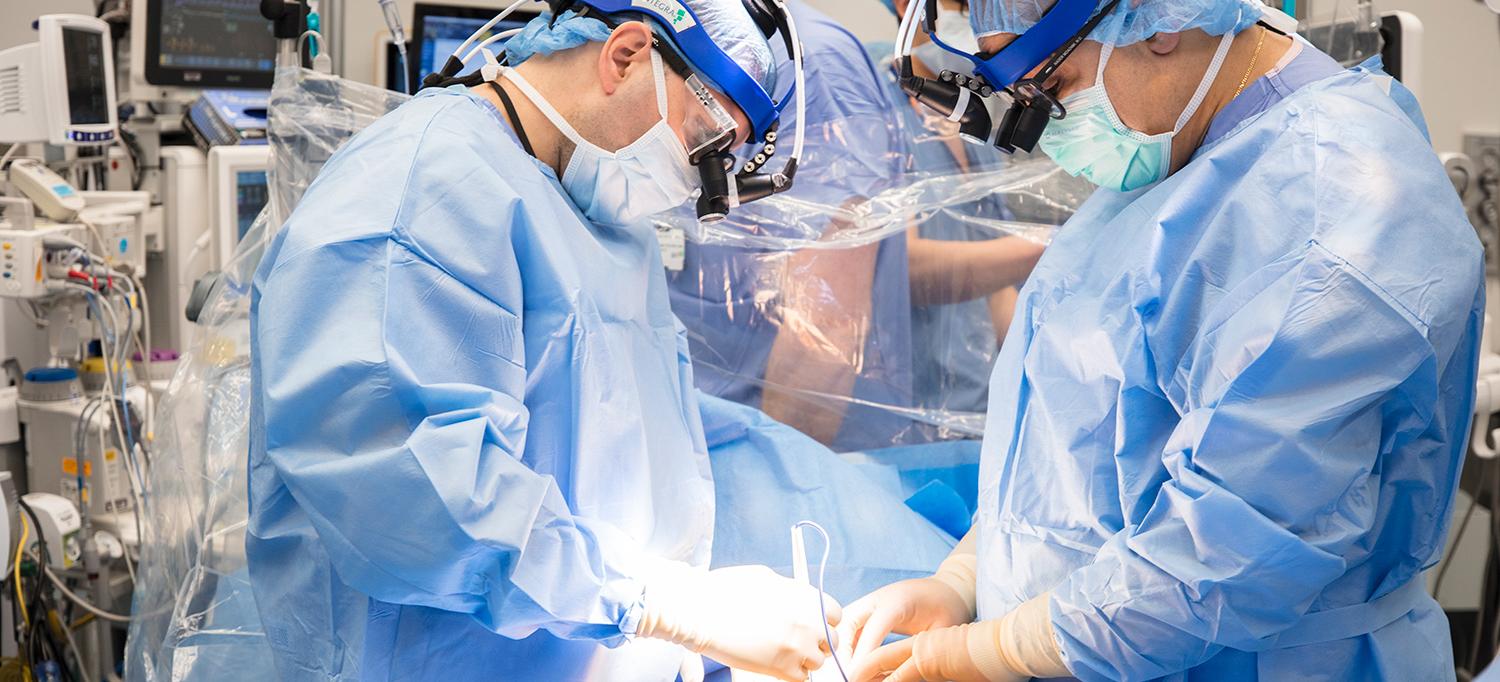NYU Langone Experts Lead Innovative Efforts to Extend & Improve the Lives of Patients with Heart Failure

Using innovative strategies such as accepting donor hearts that are positive for the hepatitis C virus, experts at the Heart Failure Advanced Care Center can reduce wait times for patients.
Photo: NYU Langone Staff
At NYU Langone’s Heart Failure Advanced Care Center, clinicians and researchers are leading innovative efforts to extend and improve patients’ lives—from novel medications and ventricular-assist devices to new techniques for surgical revascularization and transplants.
Heart Transplant Program Meets Demand with Innovation
Since its inauguration in January 2018, the Heart Transplant Program, part of the Transplant Institute, has generated strong outcomes that reflect the skill set and experience of NYU Langone’s multidisciplinary team, drawn from top programs across the country.
“We organize the evaluation and testing process into a tight time frame, aggressively assess every single donor heart offer, and employ innovative strategies to enlarge our supply of donor organs,” explains Nader Moazami, MD, professor of cardiothoracic surgery and surgical director of heart transplantation and mechanical circulatory support.
One such innovation, undertaken as part of an ongoing prospective study, is to accept donor hearts that are positive for the hepatitis C virus (HCV).
“A growing body of research shows that these hearts can be used safely because HCV typically has a 20-year incubation period and can be effectively controlled with anti-viral medications,” notes Alex Reyentovich, MD, associate professor of medicine, medical director of the Heart Transplant Program, and clinical director of the Heart Failure Program. “We’re exploring every possible pathway to help patients get the organs they need, as quickly as possible.”
“We’re exploring every possible pathway to help patients get the organs they need, as quickly as possible.”—Alex Reyentovich, MD
As a result of this adaptive, forward-looking approach, the program—which was certified by the Centers for Medicare and Medicaid Services (CMS) in August—already has the fastest transplant rate and one of the shortest average wait times in the region. “Over the past decade, the wait list for transplant patients in New York State has increased by 40 percent,” notes Dr. Moazami. “By developing more efficient procedures and protocols, we hope to improve outcomes for patients everywhere.”
Pioneering Improved Treatments for Complex Heart Failure
Patient volume growth of 46 percent at the Heart Failure Advanced Care Center has been driven in part by the expansion of high-risk surgical revascularization—the complex treatment of coronary artery disease associated with abnormal heart muscle function. NYU Langone is among only a few institutions nationwide that perform such procedures, largely due to expertise in techniques to prevent or manage postcardiotomy cardiogenic shock.
“We use a variety of individualized strategies, enabling us to help many high-risk patients who would be turned away from other centers,” explains Deane E. Smith, MD, assistant professor of cardiothoracic surgery, associate director of Heart Transplant and Mechanical Circulatory Support, and co-director of the Thoracic Aortic Disease Program.
These methods include a wide range of approved and investigational approaches—including extracorporeal membrane oxygenation (ECMO) and surgically or percutaneously implanted ventricular assist devices (VADs)—that can help patients tolerate revascularization procedures and act as bridges to recovery, transplantation, or the implantation of VADs designed for longer-term use.
Expanding Options for Cardiac Amyloidosis
The Cardiac Amyloidosis Program at NYU Langone, led by Dr. Reyentovich, treats nearly 100 patients for this complex cause of heart failure. One of just a handful of programs across the country focused exclusively on cardiac amyloidosis (CA), it brings together experts from a wide range of subspecialties.
Two types of CA account for the majority of cases: immunoglobulin light chain amyloidosis (AL-CA) and transthyretin amyloidosis (ATTR-CA). About 1,200 people are diagnosed with AL-CA each year, and while ATTR-CA was once thought to be similarly rare, a recent study found that more than 25 percent of hospitalized heart failure patients 60 and older with preserved ejection fraction showed signs of the disease.
“Fortunately, several new therapies have emerged that can improve survival and quality of life for these patients, including chemotherapeutic regimens for AL-CA and various investigational medications for ATTR-CA,” says Dr. Reyentovich.
NYU Langone was a recruiting center for the multisite, international Transthyretin Amyloidosis Cardiomyopathy Clinical Trial (ATTR-ACT), which tested an orally administered drug, tafamidis. According to a report published in September in the New England Journal of Medicine, the therapy significantly reduced mortality (to 29.5 percent, compared with 42.9 percent for placebo) and cardiovascular-related hospitalizations (to 0.48 per year, compared with 0.70 per year for placebo) in ATTR-CA patients.

